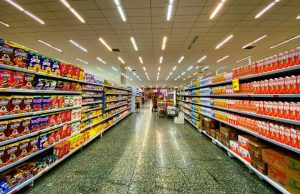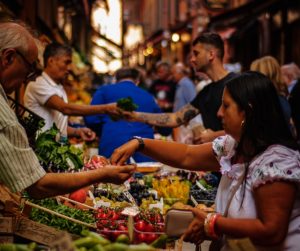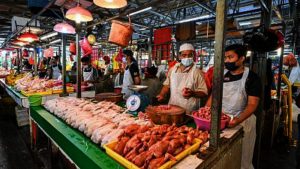Functions of the retailer: In a market, there are the distribution channels which are paths through which goods and services from the producer to the final consumer. A distribution channel can be direct or indirect. It is direct when the producer sells directly to the final consumer. It is indirect when there are intermediaries between the producer and the final consumer. The intermediaries consist of wholesalers, retailers, distributors, and the internet. They are also called Middlemen. There are responsible for goods to the final consumer from a producer who is far away, sometimes abroad.
A wholesaler buys directly in bulk from the manufacturer and resells to retailers who then sell to the final consumer.
A retailer is a middle man in the indirect distribution channel which is responsible for selling goods to the final consumers.
They buy the goods from wholesalers or manufacturers and sell them to the end-user in small quantities. A retailer is identified by who he sells his goods to and the quantity he sells. Retailers sell in units to people who finally use the product. It is a retail transaction where the buyer does not resell the goods he bought but makes personal use of them.

Recommended: Major functions of the Manufacturers in the chain of distribution
There are different types of retailing which are:
a. Store retailing: This is the common kind of retailing where the retailer has a store where he keeps a variety of the products that will be sold to the final consumers. Examples of store retailing are department stores, convenience stores, supermarkets, etc.
b. Non-store retailing: This is a kind of retailing where the sales transaction happens outside the conventional retail stores. It could either be the retailer going from door to door to sell or putting up vending machines for self-services.
c. Corporate retailing: It is also referred to as organized retailing. Corporate retailing includes retail organizations such as corporate chain stores, franchises, retailer and consumer cooperatives, and merchandising conglomerates.
Also see: Advantages and Disadvantages of of Capitalism
Each store worked by the business element comprises a different retail location area and should be approved independently from different stores worked or potentially possessed by a similar business element. They have greater purchasing power than independently owned retail stores. Even their employees go through special training before working in corporate retail stores.
d. Online retailing: Also known as internet retailing, online retailing involves selling goods in small quantities to an end-user(the goods are advertised to a large group of end-users though) without the customers touching or feeling the goods.
There is no physical store in online retailing. Most social media applications have features that encourage online retailing like WhatsApp business and Facebook marketplace. Popular online retail stores are Amazon and Aliexpress.
Also see: Advantages and Disadvantages of a mixed economy
e. Service retailing: Retailing is not limited to goods alone, services are also retailed. When a person sells services directly to a person or small group of persons, he is a service retailer. Examples of service retailers are hotels and motels, banks, airlines, colleges, hospitals, movie theaters, tennis clubs browsing alleys, restaurants, repair services, hair salons, and dry cleaners.
There are three times of service retailing; full services, assorted services, and self-service retailing.
Recommended: Best education system in the world
The functions of a retailer in the distribution channel and the economy
1. Providing assortments: Manufacturers manufacture vast amounts of comparable things and want to sell them in bulk to a few buyers. Cadbury’s makes chocolates, and Kellogg makes breakfast cereals, for example. Manufacturers generally specialize in producing specific types of products. If such firms opted to open their stores offering exclusively their items, customers would have to shop at a variety of locations to meet their needs.

Retailers gather a variety of products and services from various sources and then offer them to their customers as an assortment. This allows their customers to choose from a wide range of brands, designs, sizes, colors, and prices all in one place. Retailers balance both sides’ expectations by acquiring and sorting commodities from various sources and putting them according to the needs of their customers.
2. Breaking bulk: This is a retailing function that benefits both manufacturers and consumers. Because it is more cost-effective for manufacturers to package and ship commodities in bigger, rather than smaller, quantities, manufacturers prefer to ship products in bulk quantity cartons to decrease transportation expenses.

Consumers, on the other hand, prefer to buy goods in smaller, more manageable quantities. Retailers buy things in greater amounts from manufacturers and then sell them to customers in smaller quantities according to their needs.
Recommended: Advantages and Disadvantages of being a Doctor
3. Marketing: Retailers are the finest medium for promoting new items since they are in direct contact with customers and can influence their decisions.
They inform customers about the benefits and features of new products and allow them to try them out.

The final route via which actual decisions are made is retail outlets. As a result, they serve as key marketing conduits for businesses. Manufacturers use smart placements, banners, adverts, deals, and other methods to enhance sales at retail outlets. Wholesalers are relieved of the burden of local publicity in their area by retailers.
Also see: Causes, Effects and Solutions to Human capital flight
4. Risk bearing: He is exposed to the danger of loss owing to fire, theft, spoilage, price volatility, and other factors. He is also responsible for the expense of transporting the items from the wholesaler, who may not be located in the place where the goods are required.
Unlike wholesalers and producers, who can sell out their products instantly, retailers must keep inventory on hand in anticipation of demand.
5. Transportation: The retailer undertakes the responsibility of conveying the goods from wholesalers or the company’s warehouse to the locality of the final consumer where it is needed. Even though the cost of transportation is accumulated into the retail price of the goods, the retailer still bears the risks of a loss if there’s an accident of the vehicle transporting the goods.
There are situations where the retailer might have to transport goods over large distances and can’t add this to his prices because if it is higher than the advertised retail price, he might not make any sales at all of that product.
Also see: How to become a successful entrepreneur
6. Convenience: Retailers choose their store sites and keep them open for longer hours so that they are conveniently accessible and available to their clients to meet their needs for goods and services as soon as they arise.
Because the retailer stocks different brands of a product, the consumer can select from an array of choices before buying. The retailer makes it convenient for the consumer to buy in the quantity that he needs and he can afford.
7. Recording and providing feedback: The retailer has direct contact with the consumers to a product, hence can get direct feedback to the manufacturer or wholesaler. He studies their tastes and preferences and provides this information to the manufacturers so they can improve on the design and quality of their products.

Also see: Countries with the best infrastructure in the world
8. Customer services: Asides from the sale of the goods directly to the consumer, a retailer sometimes has to provide some services to the customer before they can use the product. These services include advice on the suitability and durability of each product, credit facilities, home delivery, and after-sale services.
The crux of a retailer’s role is in delivering goods from manufacturers to the final consumers.
Examples of retailing stores include Traditional brick-and-mortar businesses such as Walmart, Best Buy, Shoprite. However, retailing isn’t only for them. Small shops in malls, online markets like Aliexpress and eBay, and even restaurants that sell food and service are all included.

Edeh Samuel Chukwuemeka, ACMC, is a lawyer and a certified mediator/conciliator in Nigeria. He is also a developer with knowledge in various programming languages. Samuel is determined to leverage his skills in technology, SEO, and legal practice to revolutionize the legal profession worldwide by creating web and mobile applications that simplify legal research. Sam is also passionate about educating and providing valuable information to people.